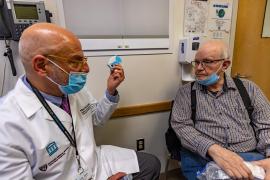Winners of Nobel Prize for Medicine Voice Concern for Future of HIV/AIDS Funding; Montagnier Discusses Therapeutic Vaccines
Luc Montagnier and Francoise Barre-Sinoussi, two French scientists who jointly were awarded half of the Nobel Prize for medicine earlier this week, spoke with French President Nicolas Sarkozy on Wednesday about the effect that the world financial crisis could have on global funding for HIV/AIDS, the AP/Hartford Courant reports. Both scientists voiced their concerns that international HIV/AIDS funding and research could decrease because of the recent global financial crisis. Montagnier also questioned whether assistance from the Global Fund To Fight AIDS, Tuberculosis and Malaria for medicines in places such as Africa could continue in light of the financial situation, according to the AP/Courant (AP/Hartford Courant, 10/8).
In related news, Montagnier on Tuesday discussed the development of a therapeutic rather than preventive HIV/AIDS vaccine, London's Daily Telegraph reports. Montagnier said that if financial backing is available, the results of a therapeutic vaccine as a possible treatment, which would prevent the virus from progressing in a person already living with HIV, could be published in three to four years. "I think it will be possible with a therapeutic vaccine rather than preventative vaccinations," Montagnier said, adding, "We would give it only to people who are already infected" (Alleyne, Daily Telegraph, 10/7).
On Wednesday, Montagnier also praised Robert Gallo of the Institute of Human Virology at the University of Maryland and French scientist Jean-Claude Chermann, Agence France-Presse reports. Montagnier said that Gallo and Chermann also deserved to be recognized by the Nobel Prize, adding, "One can feel regret that Dr. Chermann and Dr. Gallo weren't on the list" (Agence France-Presse, 10/8).
Editorials
Two newspapers recently published editorials about the 2008 Nobel Prize in medicine. Summaries appear below.
-
Baltimore Sun: In science, "great things often are accomplished through the collective effort of many individuals," a Sun editorial says, adding that the discovery of HIV in 1983 was "such an achievement." Barre-Sinoussi and Montagnier were awarded the Nobel Prize in medicine for "that breakthrough," the editorial says, adding, "But because of a technicality in the rules governing the award of the prize," Gallo "did not share in the accolades." Nobel Prize "rules are narrowly tailored to reward only those who initially discover scientific principles or phenomena rather than those who put such knowledge to practical use," according to the editorial. It adds that although Gallo was not the "first to identify the virus, it was he who made the crucial connection between HIV and AIDS that allowed scientists to begin developing drugs and vaccines to combat the epidemic's spread." The editorial says that "millions more lives would have been lost before the pandemic was checked" if "not for [Gallo's] pathbreaking research." It concludes, "That work more than qualified him for recognition as a giant as well" (Baltimore Sun, 10/8).
-
Philadelphia Inquirer: "Congratulations to the three scientists awarded the Nobel Prize in medicine" -- Barre-Sinoussi, Montagnier and Harald zur Hausen, who discovered the human papillomavirus -- "for their work in discovering viruses behind two deadly illnesses," an Inquirer editorial says. About 25 million people have died from AIDS-related causes since the virus that causes it was discovered, and 33 million people are living with HIV worldwide, the editorial says, adding that about 250,000 women die annually from cervical cancer, which is caused by HPV. According to the editorial, after being awarded the Nobel Prize, Montagnier said that the "fight" against HIV/AIDS "is not finished." It concludes, "But both discoveries have helped combat two devastating diseases" (Philadelphia Inquirer, 10/9).






